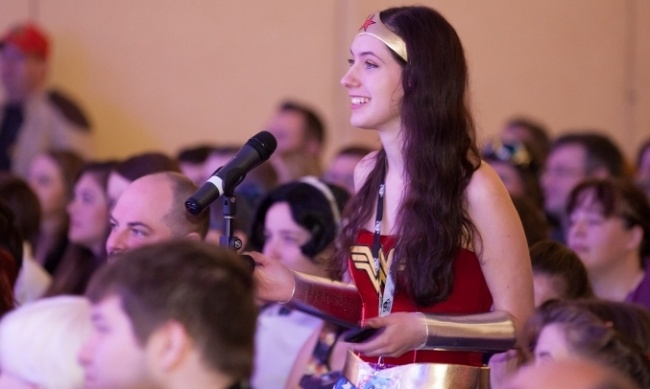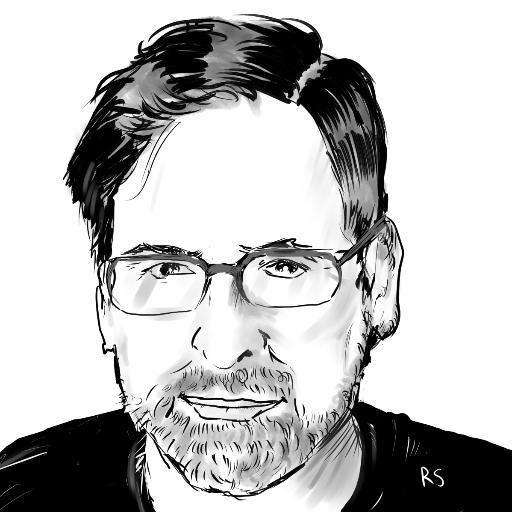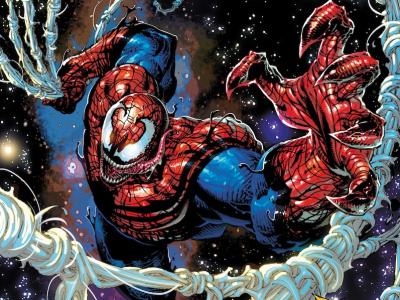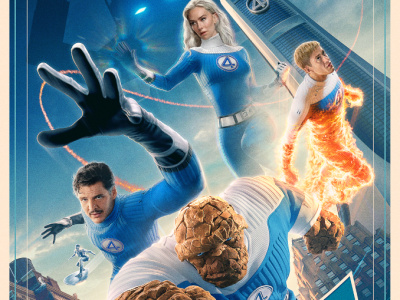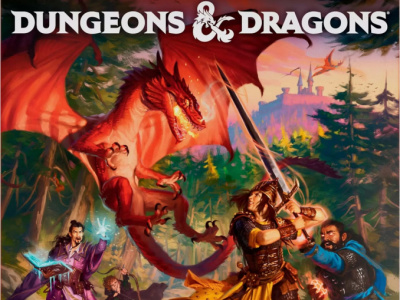Fans travelled from all over the Maritimes and northern New England, some from as far away as the UK, to spend three days geeking out in the Halifax Trade and Convention Center. The marquee guests were Gates McFadden (Dr. Crusher from Star Trek: TNG), voice actor Phil Lamarr (Samurai Jack, Static Shock, Justice League’s Green Lantern), Natalia Tena (Harry Potter) and Aaron Ashmore (Smallville, Warehouse 13), along with an assortment of authors, artists, celebrity cosplayers, and, oddly, a writer-and-sayer-of-things-about-comics.
Like a big show, only small. I often think of my hometown show in Seattle, Emerald City Comic-Con, as having the vibe of a small con that got big. Hal-Con was the direct opposite of that: it was like a much larger convention in terms of coverage of fan interests, but condensed down into a more compact venue.
This was the first time in a while that I’d been to a show of this scale, and the first time ever at a smaller show that was in the “celebration of fandom” category rather than having some specific focus. Tickets to Hal-Con had sold out in advance, so the venue was at or near capacity at most times, feeling busy but not oppressively crowded. Most of the attendees represent the rising generation of fans with broad pop culture appetites and less nostalgic attachment to the collectibles side of the business. Cosplay was king (and queen), as has become standard.
Many of the homemade costumes walking the floor rivalled or surpassed those of the professionals and guests. Despite the limited focus on content, my fellow authors and I all did pretty well on sales, with a good cadence of interactions with attendees throughout the weekend.
There were maybe 100 dealers in the exhibition area, which was held in the city’s hockey rink, because Canada; a robust gaming area; two rooms for guests and autographs; about a half-dozen concurrent programming tracks featuring all the usual subjects, and lots and lots of cosplay.
It was a bit disconcerting to find only two or three booths in the exhibit area devoted to comics, graphic novels or any kind of books, compared to dozens featuring crafts, apparel, geek culture-oriented snacks and fan art, but every dealer and fan I talked to seemed to be having a pretty good show.
Part of the community. On the final day of the show, I moderated a panel featuring the organizers of Hal-Con and several other shows in the region, where the audience consisted primarily of people thinking about doing their own events in their communities. Because Hal-Con is a non-profit, their main concerns are managing growth, fan experience and sustainability, not making a killing. All the shows in the region, from New Brunswick to Newfoundland and Labrador, try to coordinate their schedules so that they don’t cannibalize the limited fan base or the pool of potential exhibitors, and try to stay out of the way of big events like FanExpo Canada or Boston Comic Con.
The spirit of collaboration was encouraging. The Hal-Con organizers, who have mostly been involved from the beginning, were generous with advice, especially with regards to managing an event based exclusively on volunteer labor, and gave candid tips on finding venues, programming, and collaborating with the local business community. It was the kind of Con-runners panel you’d have seen a dozen or so years ago in larger markets, before the business became so sharp-elbowed and professionalized.
Lessons from a small market con. All the light and heat being generated at the 100K+ top tier of the fan con market is attracting a lot of attention and driving the economics of the business, but there is still plenty of room for good, local and regional shows if they are well-run. Here are a few observations based on my experience attending the show and consulting with the organizers.
- Growth is happening at every level. In seven years, Hal-Con has grown organically from about 1,500 to over 9000 attendees, and would have had more this year if the city had completed its new event venue on time. This is a pretty healthy rate of growth for a convention serving a large, remote geographic region from an urban center about the size of Portland, Oregon, and they are doing it by producing an event aimed at the broad center of fandom, not its edges.
- Volunteer labor, and thus a non-profit status, seems essential for smaller shows. Hal-Con just started paying its Executive Director this year, and she is the only paid employee in the organization. Everything else is volunteers, from the organizing committee to the people who drive the guests to and from the airport. They are able to lawfully do this because they are a non-profit (the laws in Canada are the same on this point as in the US); employing paid labor would significantly increase the cost structure, and thus the ticket prices, and would probably make the enterprise unsustainable.
- Smaller shows succeed by being strategic with their guests. A small-market show is constrained in a couple of ways in terms of guests. First and most obviously, a small show has limited resources to spend on top names. It also costs more to fly guests to cities that are a little bit off the grid. But also, when it comes to second-tier guests like artists and writers counting on making some money from sales over the weekend, make sure the guests you invite are selling stuff within the economic reach of the local fans. A name artist selling $200 sketches and $500 original pages is going to have a much harder time at a show like this, especially when competing with fan or semi-professional artists in the exhibit hall selling attractive originals and prints for $20.
The main point is that any con can be successful if its costs and scale are calibrated properly to the fan base, and its main focus is on providing a great fan experience. My time at Hal-Con left me feeling much more optimistic about the future of small and local conventions than I am about the shows in the 20-50K range.
The opinions expressed in this column are solely those of the writer, and do not necessarily reflect the views of the editorial staff of ICv2.com.
Rob Salkowitz (@robsalk) is the author of Comic-Con and the Business of Pop Culture.



